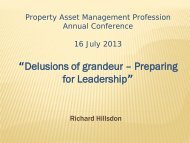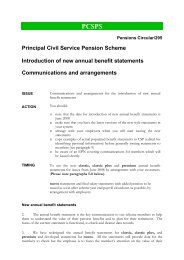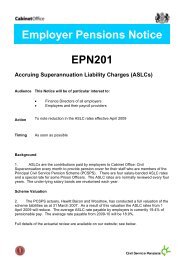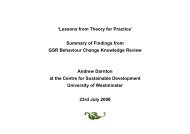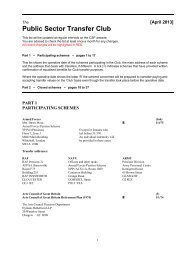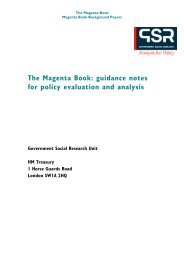Analysis and Use of Evidence - The Civil Service
Analysis and Use of Evidence - The Civil Service
Analysis and Use of Evidence - The Civil Service
You also want an ePaper? Increase the reach of your titles
YUMPU automatically turns print PDFs into web optimized ePapers that Google loves.
UNCLASSIFIED<strong>Analysis</strong> <strong>and</strong> <strong>Use</strong> <strong>of</strong><strong>Evidence</strong>Research <strong>and</strong> analysis in governmentThis document is maintained by the Analytical Coordination Working Group (ACWG)who provide support to the Heads <strong>of</strong> <strong>Analysis</strong> group.UNCLASSIFIED1
UNCLASSIFIEDScientists <strong>and</strong> engineers (members <strong>of</strong> the Government Science <strong>and</strong>Engineering Community). Applying science <strong>and</strong> engineering knowledge tounderst<strong>and</strong> problems <strong>and</strong> develop policy solutions, including theapplication <strong>of</strong> knowledge from individual specialismsEach <strong>of</strong> the five analytical disciplines works together to provide the bestpossible evidence. Each have different, skills <strong>and</strong> backgrounds – furtherdetails provided later – <strong>and</strong> has their own leadership <strong>and</strong> managementstructures but all should be able to look at the problem <strong>and</strong> indicate whichteam <strong>of</strong> analysts would best be able to answer a problem, or signpost to theappropriate analyst for each particular question.Each discipline ensures highly skilled <strong>and</strong> pr<strong>of</strong>essional staff through rigorousrecruitment procedures; adherence to competency frameworks specific to thatdiscipline; continuous learning <strong>and</strong> development programmes. Manygovernment analysts are also members <strong>of</strong> relevant pr<strong>of</strong>essional bodies <strong>and</strong>learned societies. As a result, government analysts represent a pr<strong>of</strong>essional<strong>and</strong> skilled resource that can add expert analysis <strong>and</strong> advice to inform choicesacross government <strong>and</strong> frontline delivery services.Over the last five years or so the five analytical pr<strong>of</strong>essions in governmenthave been working increasingly closely together. <strong>The</strong> most robust <strong>and</strong>thorough evidence base for a problem will most <strong>of</strong>ten come from consideringit from a number <strong>of</strong> perspectives/evidence streams. This can be achieved byensuring that a multi-disciplinary group <strong>of</strong> analysts consider the problem.Many departments now ensure analysts work within multi-disciplinary teamsto facilitate this approach.Developing or implementing strategy <strong>and</strong> policy is, <strong>of</strong> course, possible withoutthe input <strong>of</strong> the analytical community, but there are risks associated with thiscourse <strong>of</strong> action. <strong>The</strong>se risks include implementing a policy that does notwork; that is more costly than expected or need be; that has unexpectedconsequences or poor public acceptance. Working collaboratively withgovernment analysts can help mitigate these risks.Signed:Government Economic <strong>and</strong> Social Research team (GESR)Government Operational Research <strong>Service</strong> (GORS)Government Statistical <strong>Service</strong> (GSS)Government Office for Science (GO-Science)/Government Science <strong>and</strong>Engineering (GSE)UNCLASSIFIED3
UNCLASSIFIEDCoordinating Research <strong>and</strong> <strong>Analysis</strong>Within departments, various arrangements exist to ensure the evidence-baseis joined-up <strong>and</strong> coherent, with different structures in place to facilitate this,depending on the departments business need. Across departments, eachdiscipline is supported by a central team which sets strategic direction <strong>and</strong>upholds pr<strong>of</strong>essional st<strong>and</strong>ards for that pr<strong>of</strong>ession. Across disciplines variousmechanisms <strong>and</strong> groups facilitate <strong>and</strong> are responsible for joining up research<strong>and</strong> analysis within government: the Heads <strong>of</strong> <strong>Analysis</strong> group, theDepartmental Directors <strong>of</strong> <strong>Analysis</strong> Network, the Chief Scientific Adviser’sCommittee (CSAC) <strong>and</strong> the Analytical Coordination Working Group.Heads <strong>of</strong> <strong>Analysis</strong> group<strong>The</strong> membership <strong>of</strong> the Heads <strong>of</strong> <strong>Analysis</strong> group is as follows:Nick Macpherson:Tony O’Connor:Richard Bartholomew:Jenny Dibden:John Beddington:Jil Matheson:Dave Ramsden:Permanent Secretary, HM Treasury (chair)Head <strong>of</strong> the Government Operational Research <strong>Service</strong>Joint Head <strong>of</strong> the Government Social Research <strong>Service</strong>Joint Head <strong>of</strong> the Government Social Research <strong>Service</strong>Government Chief Scientific AdviserNational StatisticianHead <strong>of</strong> the Government Economic <strong>Service</strong><strong>The</strong> Heads <strong>of</strong> <strong>Analysis</strong> group aims to champion first-rate analysis acrossgovernment to ensure policy <strong>and</strong> delivery <strong>of</strong> government services is aseffective as possible.Its objectives are to:Deliver more consistency between disciplines to achieve the goal <strong>of</strong>working more effectively togetherIdentify emerging issues <strong>and</strong> new trends through the joining up <strong>of</strong> issuesraised by each discipline <strong>and</strong> the research councilsTackle issues <strong>of</strong> common interest to all, for example engagement with theResearch CouncilsThus, the group will tackle the how to collaborate effectively <strong>and</strong> championcoordinated analysis as well as what should be collaborated on. Thiscoordination is both within <strong>and</strong> across departments.Departmental Directors <strong>of</strong> <strong>Analysis</strong> network (DDAN)This is a network <strong>of</strong> the most senior social scientist from each department. Itaims to share learning across departments, identifying common challenges<strong>and</strong> solutions, providing a senior collective voice for departmental crossgovernmentworking on the social sciences <strong>and</strong> brings key issues to theHeads <strong>of</strong> <strong>Analysis</strong>.Its objectives are:UNCLASSIFIED4
UNCLASSIFIEDGovernment Economic <strong>Service</strong> – GES<strong>The</strong> Government Economic <strong>Service</strong> is the pr<strong>of</strong>essional body for economists inthe UK public sector. Its Joint Heads are Dave Ramsden (Chief EconomicAdviser to HM Treasury) <strong>and</strong> Tera Allas (Director General <strong>of</strong> Economics atBIS).GES promotes the use <strong>of</strong> economics in government, maintains high st<strong>and</strong>ards<strong>of</strong> fast stream entry <strong>and</strong> has an externally moderated continuous pr<strong>of</strong>essionaldevelopment scheme.For government, economics is the art <strong>and</strong> science <strong>of</strong> choosing one action orthing over another on the basis <strong>of</strong> analysis, use <strong>of</strong> evidence <strong>and</strong> explicitweightings on both ethical considerations <strong>and</strong> expected outcomes.Economists are equipped with powerful analytical frameworks <strong>and</strong> tools forempirical studies <strong>and</strong> have particular strengths in:Setting <strong>and</strong> analysing the effects <strong>of</strong> incentivesUnderst<strong>and</strong>ing <strong>and</strong> applying the strengths <strong>and</strong> weaknesses <strong>of</strong> marketbased processesMaking explicit the weightings being given to estimates <strong>and</strong> ethicalconsiderationsOption appraisal <strong>and</strong> evaluation/cost benefit analysisRegion, sector <strong>and</strong> macro economic policyEconometrics <strong>and</strong> ForecastingFor more information on the Government Economic <strong>Service</strong> contact:Government Economic <strong>and</strong> Social Research teamRoom 1/15HM Treasury1 Horse Guards RoadLondonSW1A 2HQTel: 020 7270 4571Email: gsr-web@hmtreasury.gsi.gov.ukUNCLASSIFIED6
UNCLASSIFIEDGovernment Operational Research <strong>Service</strong> – GORSOperational Research <strong>Service</strong>s are provided in most government departmentsto improve their efficiency <strong>and</strong> effectiveness.Operational Research is the application <strong>of</strong> scientific methods to managementproblems. It aims to provide a rational basis for decision-making, byunderst<strong>and</strong>ing <strong>and</strong> structuring complex situations. Often this involves buildingmathematical models to predict system behaviour <strong>and</strong> thereby assist theplanning <strong>of</strong> changes to the system.Operational Research originated in Britain during World War II when it wasused to apply mathematical techniques to the planning <strong>of</strong> military operations.Since then it has become recognised as an important input to decisionmakingin business, industry <strong>and</strong> government.Examples <strong>of</strong> Operational Research skills <strong>and</strong> techniques include:Manpower planning <strong>and</strong> pay modellingModelling <strong>and</strong> estimationSimulationLinear <strong>and</strong> mathematical programmingOther optimising techniquesS<strong>of</strong>t systemsOutput <strong>and</strong> performance managementUsing statistical methods in research or for predictionForecasting e.g. using time series, multiple regressions <strong>and</strong> other methods<strong>The</strong>re are now over 360 Operational Research staff in 17 departments <strong>and</strong>agencies, working on all areas <strong>of</strong> policy, operations <strong>and</strong> corporate functions.For more information please contact:GORS Central Management UnitSW Wing, South Spur4th FloorBush HouseStr<strong>and</strong>LondonWC2B 4RDwww.operational-research.gov.ukUNCLASSIFIED7
UNCLASSIFIEDGovernment Social Research <strong>Service</strong> – GSRSocial research is scientific enquiry that measures, describes, explains <strong>and</strong>predicts changes in social structures, attitudes, values <strong>and</strong> behaviours <strong>and</strong>the factors which motivate <strong>and</strong> constrain individuals <strong>and</strong> groups in society.Good social science research helps make good government strategy, policy<strong>and</strong> delivery.Social science research informs the development, implementation <strong>and</strong>evaluation <strong>of</strong> a wide range <strong>of</strong> government policies. <strong>The</strong> best results are <strong>of</strong>tenthe result <strong>of</strong> teamwork, with GSR members <strong>and</strong> policy/delivery <strong>of</strong>ficialsworking together throughout the development <strong>and</strong> implementation <strong>of</strong> an ideato ensure it is as evidence based as possible. Engagement as early aspossible in this process helps ensure the results <strong>of</strong> any analytical work are asuseful as possible.<strong>The</strong> Government Social Research (GSR) community consists <strong>of</strong> roughly1,000 social scientists with a background in many contributory disciplines (e.g.sociology, psychology, statistics, anthropology, criminology, socialgeography). <strong>The</strong> research commissioned <strong>and</strong> conducted by GSR uses themethods <strong>of</strong> social scientific enquiry including surveys, qualitative research,analysis <strong>of</strong> administrative <strong>and</strong> statistical data, case studies, controlled socialexperiments <strong>and</strong> trials.Members <strong>of</strong> GSR are based in 20 government departments <strong>and</strong> the devolvedadministrations. <strong>The</strong> service is led by the joint heads <strong>of</strong> the GovernmentSocial Research service, Richard Bartholomew <strong>and</strong> Jenny Dibden, who aresupported by the Government Economic <strong>and</strong> Social team – GESR. GESR isresponsible for harnessing existing learning <strong>and</strong> knowledge across theanalytical community; setting pr<strong>of</strong>essional st<strong>and</strong>ards for GSR members;setting recruitment <strong>and</strong> promotion st<strong>and</strong>ards <strong>and</strong> ensuring training <strong>and</strong>development opportunities <strong>and</strong> the continuous development <strong>of</strong> its members.For more information about GSR please contact:Government Economic <strong>and</strong> Social Research teamRoom 1/15HM Treasury1 Horse Guards RoadLondonSW1A 2HQTel: 020 7270 4571Email: gsr-web@hmtreasury.gsi.gov.ukUNCLASSIFIED8
UNCLASSIFIEDGovernment Statistical <strong>Service</strong> – GSS<strong>The</strong> Government Statistical <strong>Service</strong> is a decentralised body spread across 30-plus government departments, administrations <strong>and</strong> agencies. <strong>The</strong> NationalStatistician – Jil Matheson – as well as being the Chief Executive <strong>of</strong> the UKStatistics Authority, is Head <strong>of</strong> the GSS. <strong>The</strong> 1,400 pr<strong>of</strong>essional statisticiansare known collectively as the Government Statistician Group, <strong>and</strong> the group’sprimary function is to collect, analyse <strong>and</strong> disseminate statistics on all aspects<strong>of</strong> national life.Through the production <strong>and</strong> dissemination <strong>of</strong> statistics, Statisticians make acrucial contribution to good government in a modern democracy, assisting inthe formulation <strong>and</strong> evaluation <strong>of</strong> policies, in the management <strong>of</strong> services forwhich Government is responsible, encouraging <strong>and</strong> informing debate, <strong>and</strong>allowing people to judge whether the Government is delivering on itspromises. High quality statistics are also a key resource for business,academia, <strong>and</strong> the wider community. With increasing emphasis on evidencebasedpolicy making <strong>and</strong> effective performance management, statistics havea greater importance than ever before, <strong>and</strong> ever increasing scrutiny is placedon them.Government Statisticians have a responsibility, via their Departmental Head <strong>of</strong>Pr<strong>of</strong>ession, to the National Statistician for the pr<strong>of</strong>essional quality <strong>of</strong> theirwork. <strong>The</strong> Continuing Pr<strong>of</strong>essional Development Framework for governmentstatisticians helps to maintain pr<strong>of</strong>essional st<strong>and</strong>ards through thedevelopment <strong>of</strong> statistical <strong>and</strong> broader competences.For more information on the GSS, please contact:Statisticians in Government TeamNational Statistician's OfficeUK Statistics AuthorityGovernment OfficesCardiff RoadNewportGwentWalesNP10 8XGTel: 01633 655339http://www.statisticsauthority.gov.uk/UNCLASSIFIED9
UNCLASSIFIEDGovernment Science <strong>and</strong> Engineering (GSE)What do scientists <strong>and</strong> engineers contribute?<strong>The</strong> science <strong>and</strong> engineering pr<strong>of</strong>ession encompasses a vast range <strong>of</strong>disciplines from water management to mobile phone technology. Scientists<strong>and</strong> engineers can be involved at any stage <strong>of</strong> a departments work on policyor delivery.Broadly speaking science <strong>and</strong> engineering add value in five key areas,supporting strategic <strong>and</strong> operational delivery through:Contribution to the knowledge basePolicy developmentLonger-term research to inform or develop policy <strong>and</strong> deliveryIdentifying (<strong>and</strong> communicating) risksSetting st<strong>and</strong>ards/benchmarkingDepending on what is needed, scientists <strong>and</strong> engineers’ advice or input ontopics may range from providing comprehensive <strong>and</strong> robust sets <strong>of</strong> options<strong>and</strong> recommendations based on in-depth investigations <strong>and</strong> knowledge togiving ‘quick <strong>and</strong> dirty’ views based on their existing knowledge to addresspolicy questions that have, for example, a two-hour turnaround.Which policies use science <strong>and</strong> engineering?Government scientists <strong>and</strong> engineers may be leading experts in their chosenfields working in specialist posts, or have general science or engineeringbackgrounds that can be applied to address more wide-ranging policy ordelivery needs.<strong>The</strong> pr<strong>of</strong>essions play a part in a wide variety <strong>of</strong> issues across Government,from those with an obvious scientific or engineering angle such as ClimateChange or better traffic management, to those that may be less obvious, suchas creative industries or the development <strong>of</strong> artificial limbs.<strong>The</strong>y contribute to a broad range <strong>of</strong> work throughout Governmentdepartments, agencies <strong>and</strong> laboratories, spanning a wide range <strong>of</strong> policy <strong>and</strong>delivery activities, including inspection, policy making, secretariat functions forscientific advisory committees <strong>and</strong> research.If you are unsure where to go for science or engineering advice, contact yourdepartmental Chief Scientific Adviser's (CSA’s) <strong>of</strong>fice or Head <strong>of</strong> Science <strong>and</strong>Engineering Pr<strong>of</strong>ession (HoSEP) who will be able to help. In some cases itmay be necessary to go through formal mechanisms to contact scientists <strong>and</strong>engineers working in arm’s-length bodies, again your departmental CSA orHoSEP can <strong>of</strong>fer you advice on this.UNCLASSIFIED10
UNCLASSIFIEDWhen should you call on them?Scientists <strong>and</strong> engineers contribute at all stages <strong>of</strong> the policy <strong>and</strong> deliverycycles, but should be called upon for new work, by default, <strong>and</strong> as early aspossible. Whilst it may be possible for answers to be ‘pulled <strong>of</strong>f the shelf’, newresearch <strong>of</strong>ten takes much longer than you may think to conduct.It is worthwhile getting-to-know <strong>and</strong> maintaining contact with scientists <strong>and</strong>engineers working in your area. This will better enable them to keep youinformed about the results <strong>and</strong> implications <strong>of</strong> new research in your area <strong>and</strong>suggest where further research might provide greater insight. It also <strong>of</strong>fersopportunities for them to find out about your work, so that they can anticipateissues that might arise <strong>and</strong> underst<strong>and</strong> the context <strong>of</strong> any requests from youfor information.You might also consider inviting scientists <strong>and</strong> engineers along to meetingsthat you attend, where their knowledge <strong>and</strong> expertise could usefully informdiscussions.Risk, uncertainty <strong>and</strong> the unknownIt can take many years for knowledge about an issue to be well understood.For this reason it is <strong>of</strong>ten necessary to make recommendations <strong>and</strong> decisionswith the best information or knowledge available at the time. Scientists usuallyindicate the uncertainty <strong>and</strong> unknown in research or knowledge as caveats,which, for example, indicate the conditions under which the same findingsmay (or may not) be expected to occur. Scientists may hold different views onhow risk, uncertainty or gaps in knowledge should be interpreted; whilst it canbe frustrating, this debate plays an important role in developing the knowledgebase.It is also worth remembering that changes in technology or other factors, suchas people’s body size, may have an impact on even mature subject areas,<strong>and</strong> change the advice that scientists may give in relation to it.Other specialismsScience <strong>and</strong> engineering should be considered, as appropriate, as part <strong>of</strong> theevidence base along with other analytical steams, such as economics <strong>and</strong>social research. It is worth noting that some specialist scientific streams, suchas veterinary scientists <strong>and</strong> healthcare pr<strong>of</strong>essionals are managed <strong>and</strong>,usually consulted, separately from the wider pr<strong>of</strong>ession.For information about the Science & Engineering Pr<strong>of</strong>ession (GSE) <strong>and</strong> howto sign up, please see http://www.civilservice.gov.uk/my-civilservice/networks/pr<strong>of</strong>essional/science-engineering/index2.aspxUNCLASSIFIED11



